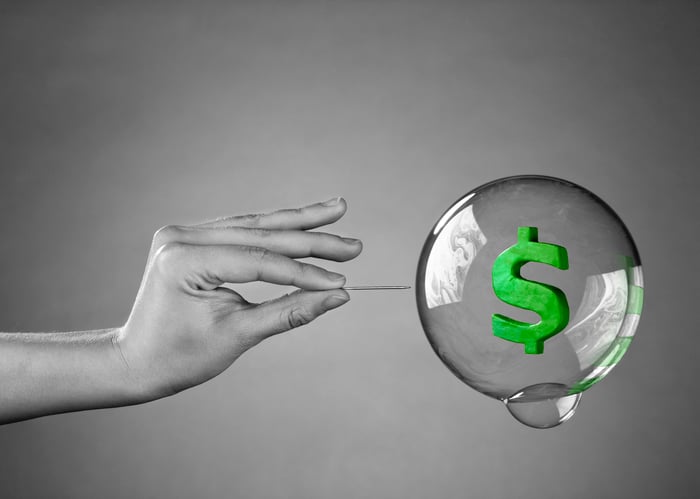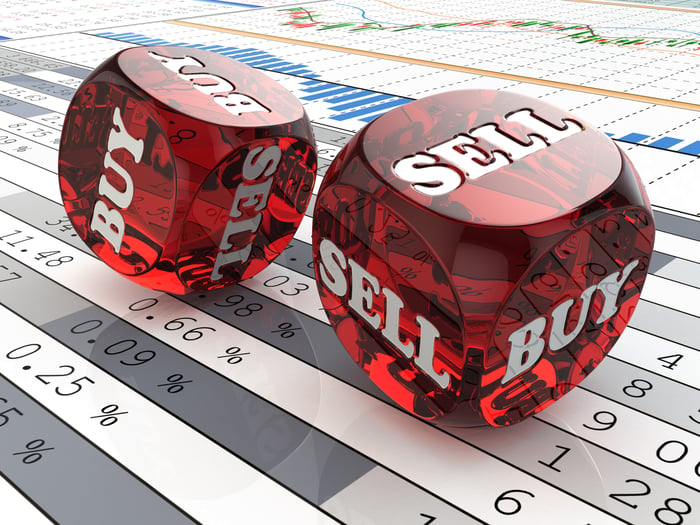In just 23 days, we'll wave goodbye to 2020. Most folks won't be sad to see 2020 put firmly in the rearview mirror. Yet, despite record-breaking volatility, the benchmark S&P 500 is on track for a double-digit gain this year after briefly losing more than a third of its value in the first quarter.
A double-digit gain is peanuts compared to what Tesla Motors' (TSLA 2.28%) shareholders have enjoyed this year. Through this past weekend, shares of the electric-vehicle (EV) manufacturer were up 616% on a year-to-date basis. Tesla has vaulted up the list of the largest publicly traded U.S. companies (currently seventh), while CEO Elon Musk has become the second-richest person in the world.
Can Tesla's stock keep the pedal to the metal going forward? Or is it time for skeptics to reverse? Let's analyze the buy and avoid arguments.

A Tesla Model S plugged in for charging. Image source: Tesla.
Here's why red-hot Tesla can continue to fly
Easily the top reason to buy into the Tesla thesis is the company's competitive edge over other auto stocks. Tesla is, after all, the first auto company in over five decades that has successfully built up from scratch to mass production. It has clear-cut first-mover advantages in the EV space. It should be able to deliver north of 500,000 vehicles in 2020. This production figure should head even higher with two major production plants in operation (Fremont, California, and Shanghai, China), and at least another two on the way (Grunheide, Germany, and Austin, Texas).
Tesla is also highly valued for its innovation, which starts with its trailblazing CEO Elon Musk. Arguably the biggest announcement this year came from the company's Battery Day event in September. At this event, Tesla announced plans to produce tabless EV batteries in-house that'll ultimately improve range by 16%, boost power by a factor of six, and reduce long-term vehicle costs such that Tesla can roll out a mass-produced, high-quality EV for about $25,000. A $25,000 EV bearing the Tesla brand name would be a gut-punch to combustion-engine vehicles worldwide.
Additionally, Tesla's share price going vertical in 2020 has all but eliminated cash concerns for the company. Share and debt offerings have allowed the company to nearly triple its available cash and cash equivalents to $14.5 billion in the third quarter from $5.3 billion in the prior-year period. This cash is pivotal to funding the rapid buildout of additional gigafactories, as well as for ongoing battery innovation.
Lastly, EVs are the future of the auto industry. A 2019 report from Allied Market Research anticipates the global EV market can grow by almost 23% annually through 2027. This would translate to more than $800 billion in annual worldwide EV sales by 2027, with Tesla likely leading the charge.

Image source: Getty Images.
Hitting the brakes might be the prudent move
Yet, there's another side to this story.
Perhaps the biggest risk for Tesla is if the company's income statements actually start to matter. Wall Street and investors usually give hypergrowth stocks a pass on profitability. But following a 616% increase this year, and more than 9,400% over the trailing 10-year period, the question must be asked: When is Tesla going to be profitable solely from selling EVs? Though it's generated a couple of quarters of nominal per-share profits, the company has relied on selling emission credits to other automakers to bolster its performance. Without these credits, Tesla is a $568 billion company that's still losing money.
It's also unclear if the company can maintain its competitive edge over the long run. Ford has pledged $11 billion for EV investments between 2018 and 2022, with General Motors setting aside an even larger $27 billion for EV and autonomous vehicle innovation through 2025. GM anticipates releasing 30 EVs globally within the next five years. It seems unlikely that Tesla will be able to maintain its stranglehold on EV market share with so many established auto companies devoting billions of dollars to innovation.
Further, investors should understand that Elon Musk can be just as much a liability as an innovator. Musk has been in trouble with the Securities and Exchange Commission on a handful of occasions. He also has a habit of overpromising and under-delivering on new technology or services. It's not that Musk fails to achieve -- it's that his timelines are overly ambitious.
History is yet another reason to be bearish. Over the past quarter of a century, every single next-big-thing investment bubble has eventually burst -- including the internet, genomics, business-to-business commerce, cannabis, and blockchain. Common sense and growing pains always creep into the picture. I have no clue when the EV bubble will burst, or how steep the decline might be, but history is a good indicator of what's eventually coming for Tesla.

Image source: Getty Images.
The verdict
Now for the $64,000 question: Should you still buy Tesla, even with shares up 616%?
After weighing both sides, I find myself very much in the bearish/avoid column with Tesla sporting a lofty $568 billion market cap.
Over the very long-term -- I'm talking "get your best pair of binoculars out and look as far as possible into the horizon" long term -- Tesla could deliver gains for investors above and beyond its current share price. However, significant upside, or any additional upside whatsoever, seems unlikely for a company that has yet to prove to Wall Street that it can generate a generally accepted accounting principles (GAAP) profit solely from the sale of its EVs.
I'm also genuinely concerned about Tesla's competition. It has clear-cut battery range and power advantages now, but is unlikely to retain this edge over the long run. Legacy automakers have the infrastructure, dealerships, and financing in place to make EVs an overnight sensation.
Things would have to go flawlessly for Tesla to build on its current valuation -- and that rarely, if ever, happens on Wall Street.





